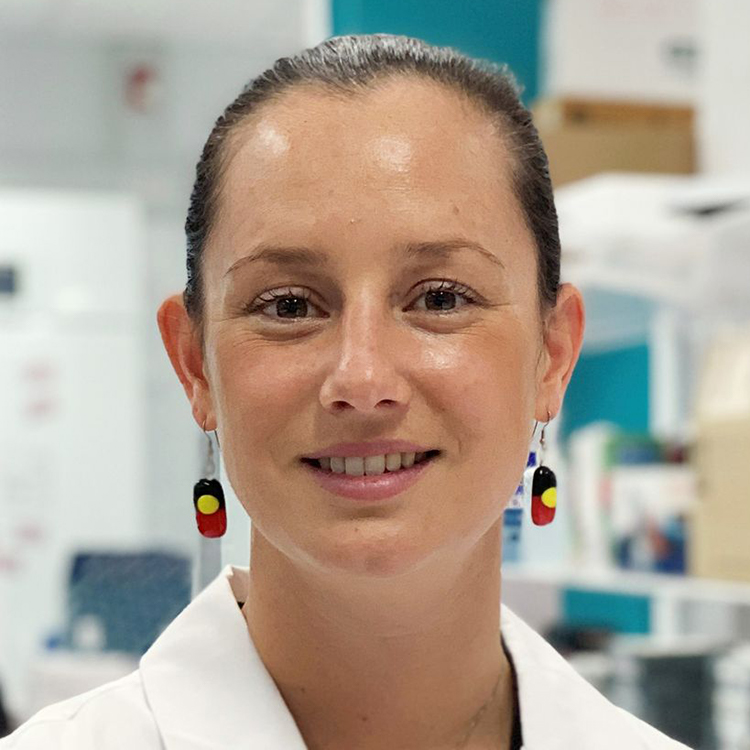
Jessica Buck
Senior Research Fellow
DPhil
jessica.buck@thekids.org.au
Dr Jessica Buck is an emerging leader in childhood cancer research, with a particular focus on brain cancer and cancer in First Nations children.
A proud Kamilaroi woman, she is the Team Leader of the First Nations Childhood Cancer Program at The Kids Research Institute Australia — a first-of-its-kind initiative dedicated to developing culturally safe, community-led research strategies to improve outcomes for First Nations children with cancer. By engaging closely with Aboriginal and Torres Strait Islander communities, her program ensures that research priorities are shaped by their needs, empowering families and transforming treatment.
Dr Buck has also made significant contributions to childhood brain tumour research, particularly in developing preclinical models to test safer and more effective therapies. Her work has contributed knowledge to identifying potential treatments that could improve survival while reducing long-term side effects in children with brain cancer.
She completed her DPhil in Oncology and MSc in Neuroscience at the University of Oxford, following a Bachelor of Biomedical Science at the University of Newcastle.
Supported by prestigious scholarships and awards, including an NHMRC EL1 Fellowship and a Forrest Research Fellowship, she has published 7research papers and secured over $3.5 million in competitive funding.
In addition to her research, Dr Buck is passionate about mentoring Aboriginal students and women in STEM through a range of initiatives.
Find Dr Buck on ORCID.
Projects
Finding new, safer and targeted therapies for paediatric brain cancer that amplify responses to radiation therapy
Radiation therapy is an essential component of brain cancer treatment. However, the high doses currently required are extremely damaging to the growing brains and bodies of children.
Developing and characterising juvenile models of aggressive paediatric brain cancers for the evaluation of novel immunotherapies.
While profound treatment responses have been realised using immunotherapy for some cancer types, this is yet to be seen for paediatric brain cancer patients.
Published research
Current gaps in knowledge and future research directions for Aboriginal and Torres Strait Islander children with cancer
Paediatric cancer is the leading cause of disease-related death in Australian children. Limited research focuses on cancer in Aboriginal and Torres Strait Islander children. Although there appears to be a lower incidence of cancer overall in Aboriginal and Torres Strait Islander children compared with non-Indigenous children, a high proportion of Aboriginal and Torres Strait Islander children are diagnosed with acute myeloid leukaemia.
Cancer Cell Biology Research in an Indigenous Childhood Cancer Context
In Australia, cancer medicine is increasingly guided by our expanding knowledge of cancer genomics (the study of genetic information) and biology. Personalized treatments and targets are often defined by an individual’s genetic profile—known as precision cancer medicine. The translation of genomics-guided precision therapeutics from bench to bedside is beginning to produce real clinical benefits for Australians living with cancer.
Towards precision cancer medicine for Aboriginal and Torres Strait Islander cancer health equity
Delivering cancer control at scale for Aboriginal and Torres Strait Islander communities is a national priority that requires Aboriginal and Torres Strait Islander leadership and codesign, as well as significant involvement of the Aboriginal community-controlled health sector. The unique genomic variation observed among Aboriginal and Torres Strait Islander peoples may have implications for standard and precision medicine.
Patient-Derived Orthotopic Xenograft Models for High-Grade Pediatric Brain Cancers
Patient-derived orthotopic xenograft (PDOX) mouse models are considered the gold standard for evidence-based preclinical research in pediatric neuro-oncology. This protocol describes the generation of PDOX models by intracranial implantation of human pediatric brain cancer cells into immune-deficient mice, and their continued propagation to establish cohorts of animals for preclinical research.
Cancer therapies inducing DNA damage
The induction of DNA damage has been employed as an anticancer strategy for more than 100years, first starting with the use of radiation to treat stomach cancer followed by the first uses of DNA-damaging chemotherapy to treat childhood leukemia.
December 2022
Veliparib Is an Effective Radiosensitizing Agent in a Preclinical Model of Medulloblastoma
Medulloblastoma is the most common malignant childhood brain tumor, and 5-year overall survival rates are as low as 40% depending on molecular subtype, with new therapies critically important. As radiotherapy and chemotherapy act through the induction of DNA damage, the sensitization of cancer cells through the inhibition of DNA damage repair pathways is a potential therapeutic strategy.
Education and Qualifications
- DPhil in Oncology (PhD) – University of Oxford, 2019
- MSc in Neuroscience – University of Oxford, 2015
- Bachelor of Biomedical Science with the Faculty of Health and Medicine Medal – University of Newcastle (Australia), 2013
Awards/Honours
- 2020 – Forrest Foundation Postdoctoral Fellowship
- 2019 – Young Australian Achiever of the Year in the United Kingdom
- 2019 – Aurora Internship Program
- 2015 – Green Templeton College DPhil Scholarship
- 2014 – Charlie Perkins Scholarship
- 2014 – Chevening Scholarship
- 2014 – Oxford Australia James Fairfax Scholarship
Active Collaborations
- “Reducing the harm caused by radiation for children with brain cancer” with Prof Martin Ebert, Sir Charles Gairdner Hospital.
